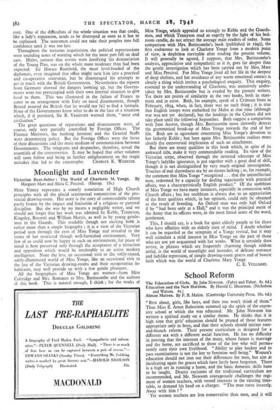Moonlight and Lavender
Victorian Best-Seller : The World of Charlotte M. Yonge. By Margaret Mare and Alicia C. Percival. (Harrap. 15s.) Miss YONGE represents a comely association of High- Church principles with all the placid sentimental romanticism of the pro- vincial drawing-room. Her story is the story of commendable talents partly frozen by the impact and limitation of a religious or parental discipline. But she was by no means a negligible writer, and we should not forget that her work was admired by Keble, Tennyson, Kingsley, Rossetti and William Morris, as well as by young gentle- men in the Guards. This readable though not exciting boak is rather more than a simple biography ; it is a view of the Victorian period seen through the eyes of Miss Yonge and revealed in the terms of her restricted though well-furnished environment. Very few of us could now be happy in such an environment, for peace of mind is here preserved only through the acceptance of a retraction and opposition which would be intolerable to an active modern intelligence. None the less, an occasional visit to the softly-tinted, softly-illuminated world of Miss Yonge, like an occasional visit to the last of the Victorian drawing-rooms and their octogenarian in- habitants, may well provide us with a few gentle pleasures.
All the biographers of Miss Yonge are women—from Miss Coleridge and Mrs. Romanes to Mrs. Battiscombe and the authors of this book. This is natural enough, I--think ; for the works of Miss Yonge which appealed so strongly. to Keble and the Guards- men, and which Tennyson read so eagerly by the light of his bed- room candle, do not attract the average male readers of today. Some comparison with Mrs. Battiscombe's book (published in 1943), the first endeavour to look at Charlotte Yonge from a modern point of view, is doubtless inevitable after reading the present volume. It will generally be agreed, I suppose, that Mrs. Battiscombe's analysis, appreciative and sympathetic as it is, goes far deeper than the gentle investigation which has been carried out by Miss Mare and Miss Percival. For Miss Yonge lived all her life in the deepest of deep shelters, and her avoidance of any warm emotional contact is clearly a thing which invites a psychological enquiry. This enquiry, essential to the understanding of Charlotte, was tentatively under- taken by Mrs. Battiscombe but is evaded by the present writers. Yet there are points of similarity in the two books, both in state- ment and in error. Both, for example, speak of a Crimean front in February, 1854, when, in fact, there was no such thing ; it is true that English troops were embirked for Malta at that time (although war was not yet declared), but the landings in the Crimea did not take place until the following September. Both suggest a comparison with Jane Austen, though Mrs. Battiscombe more shrewdly detects the grammatical break-up of Miss Yonge towards the end of her life. Both are in agreement concerning Miss Yonge's devotion to her fatherly Keble ; but here again Mrs. Battiscombe realises more clearly the extroversial implication of such an attachment.
But there are many qualities in this book which, in spite of its awkward title, make it very commendable reading. Its view of the Victorian scene, observed through the inverted telescope of Miss Yonge's ladylike ignorance is put together with a great deal of skill, though it is not distinguished by very much original investigation. Touches of real shrewdness are by no means lacking; as, for example, the comment that Miss Yonge "recognised . . . that the unintellectual man, redeemed by a capacity for dealing sagaciously with practical affairs, was a characteristically English product." Of the snobbism of Miss Yonge we have many instances especially in connection with Church affairs' but her snobbism is always due to an appreciation of the finer qualities which, in her opinion, could only be obtained as the result of breeding. An Oxford man was only half Oxford if he "had been only at a Hall," and it was the principal merit of the Army that its officers were, in the most literal sense of the word, gentlemen.
This, I should say, is a book for quiet elderly people or for those who have affinities with an elderly state of mind. I doubt whether it can be regarded as the symptom of a Yonge revival, but it may well stimulate a mild interest in Miss Yonge on the part of those who are not yet acquainted with her works. What it certainly does revive, in phrases which are frequently charming though seldom artful, is the world of moonlight and lavender, of delicate romance and ladylike repression, of simple drawing-room graces and of honest faith which was the world of Charlotte Mary Yonge.
C. E. VULLIAML


































 Previous page
Previous page